The Power of Setting
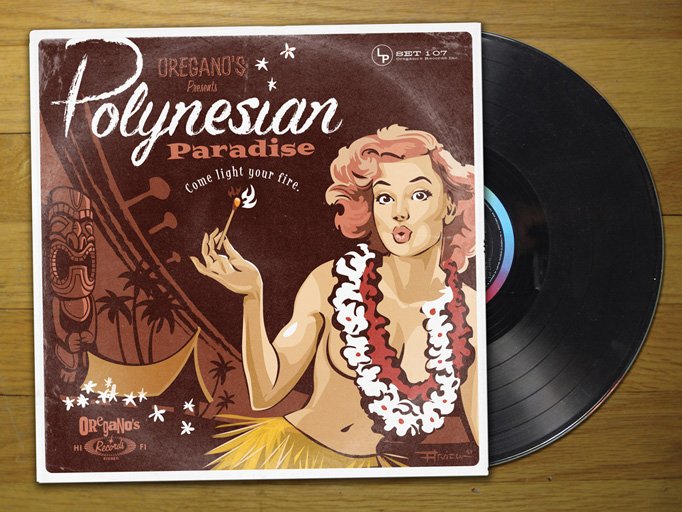
Local Arizona Italian restaurant Oreganos perpetuates the Tiki bar
Nathan, the Pulp Archivist, has an awesome blog up at Castalia House Why Settings Matter. He uses the tiki bar as an example of a bit of fiction that seemed so real that it perpetuated itself into reality. You should go read it, as Nathan along with JD Cowan is one of the people I turn to when I want to understand the kind of mythic and futuristic adventure fiction I like to read.
I was also inspired to expand on some things I wrote about last month in the post Pulp Stories and Character Death. In that post, I looked at the form of a story, whether romance, comedy, irony, or tragedy. I also looked at the mode of a story, which is not wholly distinct from form, but you get interesting combinations when you mix and match. The modes are myth, romance, high and low mimetic, and ironic.
Frye's five “modes” of fiction, with each mode defined by the power of the hero. Here they are, in their proper order, which also happens to be a brief outline of the development of literary forms in the modern West since the Dark Ages, and of the ancient West in the previous cycle:
---In the mode of myth, the hero is superior in kind to other men and the environment of other men. These stories in which the hero is a divine being are important for literature, but generally fall outside the normal literary categories.
---In a romance, the hero is superior in degree to other men and to the environment, but is simply an extraordinary human being. The laws of nature in romances are often not those that we meet in the real world, but they are self-consistent once they are established.
---The high mimetic mode obtains when the hero is superior in degree to other men, but not to the environment. This is the kind of hero Aristotle principally had in mind: the leader whom we find in most epic and tragedy.
---The low mimetic mode treats of a hero who is no better than the rest of us, which we find in most comedy and realistic fiction. We respond to the hero's common humanity in this sort of fiction. The story must display the canons of probability that we use in ordinary experience.
---When the hero has less power or intelligence than ourselves, so that the scene is one of bondage, absurdity, or frustration, the mode is ironic.
Today, I want to talk about how the implicit or explicit stage or phase of civilization affects a story. I’m going to borrow the Spenglerian framework because that’s the one I’m most familiar with, but it readily translates to other thinker’s descriptions. And also because I like to continue John J. Reilly’s version of Spengler with a smile.
Spengler made an analogy with the four seasons of the the year, but there are actually five phases.
Spengler divided up the life phases of civilizations in different ways, depending on whether he was talking about their artistic life, political history, or spiritual life (the latter covering, roughly, philosophy and religion). To put all the possible periods together, he makes mention of:
A precultural period, when people are essentially barbarians, as was the case in what is usually called the Dark Ages of Europe;
Spring, an age of faith like the High Middle Ages in Europe;
Summer, like the Renaissance and early Baroque, when the culture develops its distinctive arts and sciences;
Autumn, when the fundamental insights of the culture reach full maturity (if not necessarily final form), as in late seventeenth and eighteenth century Europe; and
Winter, when the creations of the past in art and science and spiritual life are perfected and elaborated, but not fundamentally extended. Technology flourishes here, rather than fundamentally new science.
You will note that there is more than a little overlap of the progression of the five modes of a story with the seasons of a civilization. This is because Frye and Spengler were looking at the same periods of history when looking for examples, and also because the phase of a civilization is in affects what is possible at a given time, whether you are talking about stories or about politics.
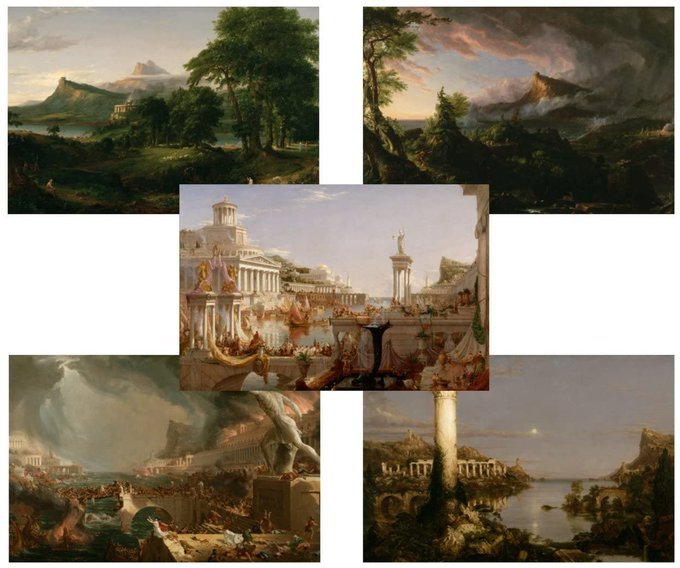
Thomas Cole’s The Course of Empire that I talked about in last week’s Linkfest also has five panels, but as the first and last are structurally equivalent, it only really has four phases. Cole combined Summer, Autumn, and Winter and pulled out the cataclysm at the end of Winter.
But let’s get to it. What do I mean by “implicit or explicit stage or phase of civilization” in a story. Let’s look at some examples. I’m going to move back and forth between the overall development of European literature and the last couple of hundred years of adventure stories, because I think there is an interesting mini-cycle in the subset of adventure that can be discerned, and possibly even another epicycle just in science fiction.
For the precultural period, we talking about myth and legend. The Iliad is the ur-example in the Western tradition. The Aeneid as well, which is a good illustration that while I suggested that civilizational phases limit what is possible, you can go too far with this idea. The Aeneid was a creation of the Winter of Rome, but in form is an epic poem from the pre-cultural period. Beowulf is somewhere on the borderland of sliding into romance.

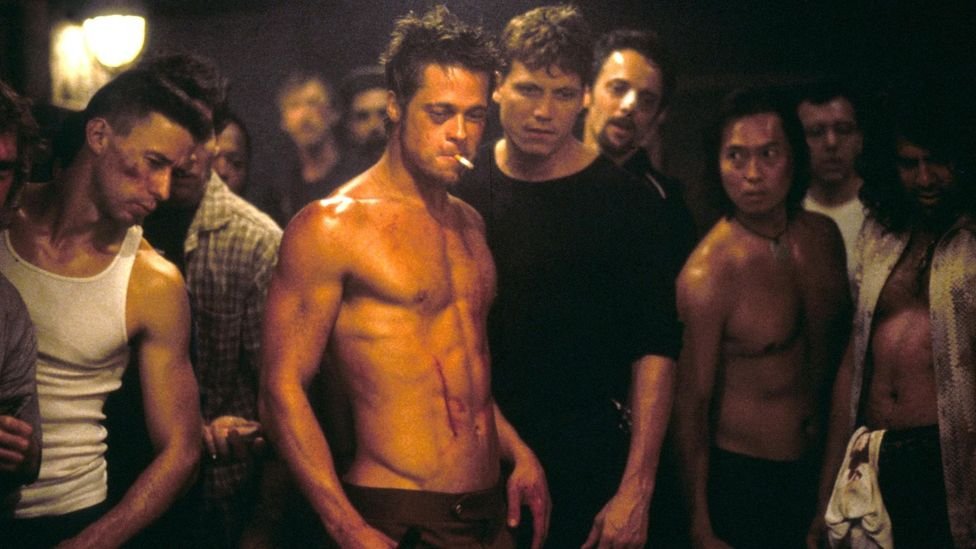
I don’t have good contemporary examples of this kind of story, as it would be really hard for us moderns to do. The closest we can get is taking irony to an extreme, which ends up looping back around to the mythic mode, but it isn’t quite the same thing as the unreflective original.
What you do get however is authors mixing civilizational phases and moods. Robert E. Howard’s Conan stories are romances, adventure stories within a pre-cultural setting. However, Conan, a bit like Beowulf, is not a deity or demigod. He is simply a superior man. Howard liked to play Conan’s rough virtues against the soft and even duplicitous virtues of the civilized men he bested. Conan himself is also something of the unlimited potential that you see in Cole’s first panel; nothing is yet determined, anything is possible. This is contrasted with many of the late Winter civilizations he finds himself in, ossified and inflexible, class-bound and unimaginative.
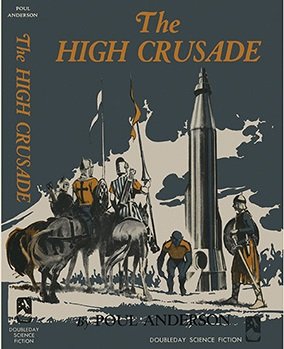
For the Springtime, I do have examples. Poul Anderson’s High Crusade is a story of the springtime, insofar as it accurately captures the mode of thinking of people of honest and hopeful faith; unreflectively confident in themselves, their culture, and their religion. It was written with something like the style of a parody, but I think that stylistic choice doesn’t undermine its representation of people who simply do not think like us. The Song of Roland is also a tale of the Springtime, even though it shares some stylistic elements with the epics that proceeded it.
Within just adventure fiction, Jules Verne’s stories are a good example of the confidence and joy that Springtime stories exhibit. The sheer energy of the Victorian era astonishes us even now. Lost World stories from this era are a fascinating variation, like Haggard’s King Solomon’s Mines, because they combine the vitality of the Victorians with the sense of decline, loss, and doom of a failing civilization. Such stories often had a memento mori element to them, as the Victorians knew well they wouldn’t be on top forever.
For us, perhaps the greatest Summertime stories are those of William Shakespeare, definitive and massively influential. I think you can make an analogy for anything someone refers to as a “Golden Age” with the plays that we still watch five centuries later.
I also see summertime as when a given idea really gels into a thing, gets reified. The Campbelline era of science fiction is when science fiction became a thing that was truly separate from the adventure stories that had proceeded it. I’m not sure that this was entirely a good thing, but it definitely happened. In the everyday sense of the term “science fiction”, lots of the basic ideas were really established at this time.
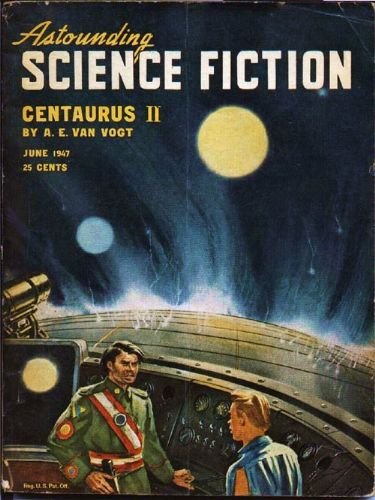
The conventional Big Three authors, Asimov, Heinlein, and Clarke, serve as a pretty good shorthand for the set of ideas and conventions that represent the Summertime of science fiction. However, I might pick as representative the now forgotten author, A. E. Van Vogt. His tale of a generation ship travelling between the stars, “Centaurus II” is one of the best of its kind.
Autumn is the development of the novel, the realistic everyman prose narrative that just so happens to match up pretty well with the low mimetic mode. So influential that everyone today thinks of even fantastic romances like The Lord of the Rings as “novels”. But, to be fair, Tolkien did slip in some characters like Sam Gamgee representing the everyman. You almost never encounter pure examples in the wild.
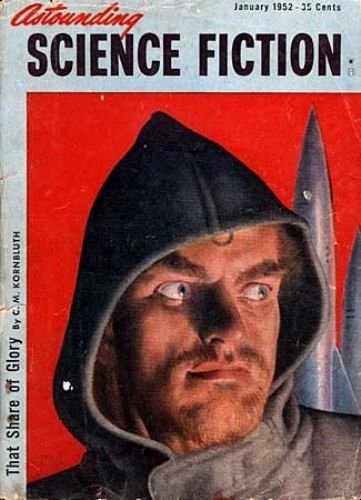
For futuristic and mythic adventure stories, this is the time of the Futurians and the New Wave, movements that invested a lot of effort into making their stories more artistic and more complex, but also often divorcing themselves from the elements that made older adventures fun and popular. C. M. Kornbluth’s “That Share of Glory” or Jack Vance’s The Dying Earth are examples of the early Autumn. Things got stranger as Autumn got late.
Winter would then correspond to a time when the literary form and style have ossified, and authors duly string together the by now expected tropes to produce yet another genre work. Winter is also the time when irony reigns supreme, and the lighthearted joy of earlier stages is absent.
Yet.even old Oswald himself said that he could have named his book The Perfection of the West. Spengler with a smile. Winter is the period of completion and perfection, the era that codifies the greatest artistic achievements of a culture and passes them on the future.
Wintertime does tend to lack the dynamism of earlier eras, but as JD Cowan’s review of science fiction fandom and stylistic change in science fiction shows us, a surprisingly large amount of effort was expended by gifted innovators to bury or discredit their stylistic forebears. The slower pace and lower stakes inherent in Wintertime give us the chance to see old things with new eyes and curate the best of what has been done.
Part of this can be the reappreciation of forgotten classics. It can also be an act of creation in its own right. I’ll take Jason Anspach and Nick Cole’s Forgotten Ruin as an example. The outsized success of Dungeons and Dragons has had unfortunate effects on fantasy literature, replacing almost everything that had been the inspiration for D&D itself with second-hand copies filtered through cultural perceptions of the game. Even people who never read this kind of book probably know exactly what I’m talking about.
This has been a real cultural loss, replacing the early and mid-twentieth century variety of fantastic adventure stories with a bunch of stuff that looks and feels the same. I think you could see Forgotten Ruin as just another D&D pastiche. But that would be a mistake. Forgotten Ruin is the freshest take on adventure stories in quite a while.
The reason why is that Cole and Anspach fully embraced the sense of wonder that an adventure story is supposed to evoke:
JD Cowan explains:
Wonder is a trait from adventure fiction and its subgenres fantasy and horror. It is the adventure of exploring new lands, peoples, and possibilities.
Cowan expands on this, quoting Sam J. Lundwall in Fandom: An Illustrated History:
"Its strong connections with the Medieval chansons de geste and other tales of chivalry with their unbearable noble heroes, incredible, constantly swooning ladies and unbelievable villains, gives the genre life and gusto and guarantees new, staggering thrills on every page. It is very dramatic, alternating between the pathetic and the grotesque and characterized by mighty heroics, swords, blood and hideous slithering things in the darkness of convenient crypts."
That last line by Lundwall is just about perfect to describe what is going on Forgotten Ruin. This story is a continuation of a very old tradition, of men gathering around a fire to tell one another exciting stories full of fantastical events and derring-do, because it is an important part of who we are.
Lundwall wasn’t actually a fan of adventure stories, as some of his terms might indicate. But he nonetheless described them well. I think that Forgotten Ruin hits all of Lundwall’s elements. It also manages to be so good because it displays the theological virtue of hope, of trust in God’s providence, which happens to be one of the most important themes of the the Lord of the Rings.
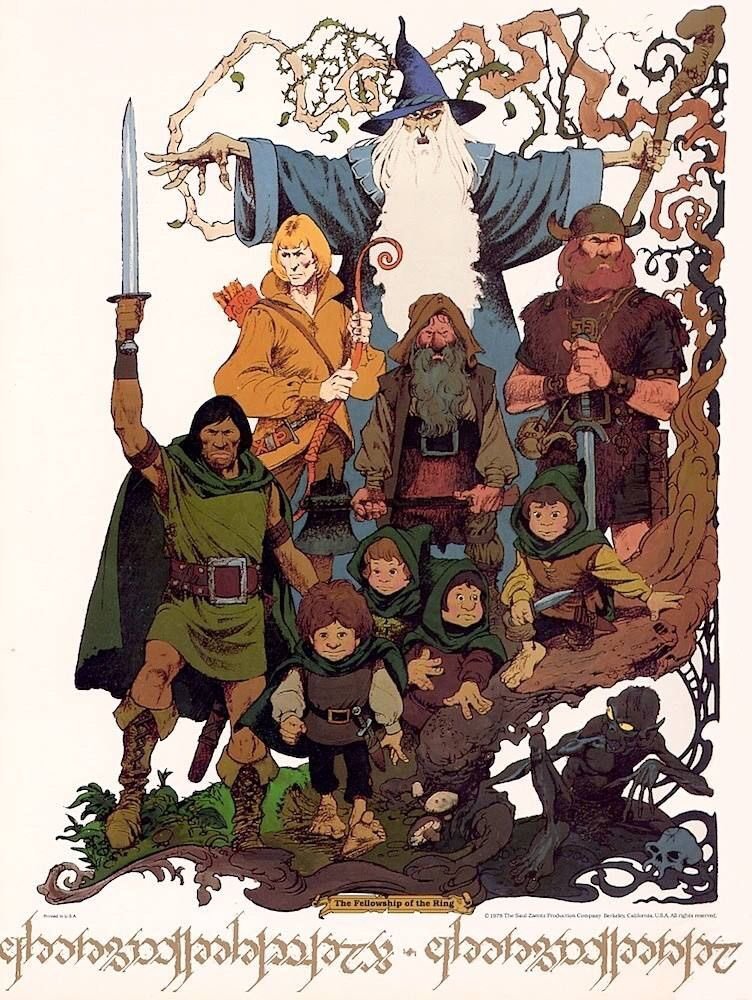
The Lord of the Rings was the other bad thing that happened to fantastic stories in the last third of the twentieth century. Lots of fantasy stories after LoTR were bad imitations of it, taking its three volume form and detailed backstory as the most important elements, while completely missing every key theme that Tolkien so lovingly wove in.
Given that Tolkien is thought to have used his imagination as a respite from the horrors of the trenches on the Western Front, it is perhaps appropriate that the final element in the mélange of Forgotten Ruin is the grunt’s experience of the Forever War that started on 9/11. Modern soldiering is destructive of both mind and body, but offers no succor of victorious and triumphant return. The experience of the veteran of Afghanistan is just as empty as that of the men who fought in the Great War, although it might seem far better to those of us who didn’t go, just because the scale of the slaughter was smaller. Lacking the consolation of a happy ending in reality, we turn to stories to find that which our hearts seek.
All this together has produced something remarkable. And, I suggest this is the characteristic product of the Wintertime, the distillation of the best a culture has to offer. An elaboration of the best elements of the massive cultural ferment that preceded us, which was exciting but also destructive or even corrosive.
My task, our task, is to find and champion the best that we have, so that we can hand it on to our literal or figurative descendants. That is the true meaning of the Perfection of the West. To identify the unlosables, those aspects of our culture that will become part of the common heritage of mankind. Winter has already come, but that isn’t truly a bad thing. The kinds of stories that can be produced now can be as good as any.



Comments ()